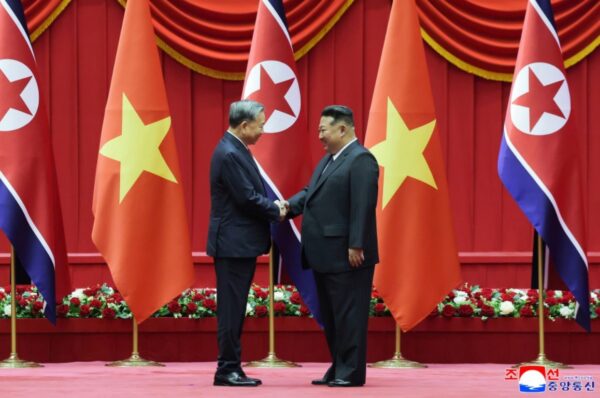Beyond China and Russia, Pyongyang relies on its lower-profile “small-node strategy” to diversify revenues. Vietnam is a case in point.
In this photo from North Korean state media, North Korean leader Kim Jong Un shakes hands with Communist Party of Vietnam General Secretary To Lam during a welcome ceremony for Lam in Pyongyang, North Korea, Oct. 9, 2025.
Despite successive rounds of sanctions, North Korea continues to generate hard currency and preserve diplomatic access. This persistence stems less from loopholes than from a “small-node strategy”: dispersing revenue and embedding low-visibility networks across jurisdictions where hedging and procedural multilateralism dominate.
China and Russia are often blamed for enabling North Korea’s illicit finance. Yet Pyongyang has long turned to Southeast Asia for its permissive financial niches, historical ties to socialist states, and sustained diplomatic presence. Vietnam is a revealing case. Its “bamboo diplomacy” – firm in aims yet flexible in practice – anchors diversified ties with major powers and embeds Hanoi in ASEAN’s process-heavy forums. This posture safeguards autonomy but also creates gray zones that sanctioned actors can test.
The 2024 lapse of the United Nations Panel of Experts (PoE) widened those gray zones by shifting enforcement to uneven national efforts. In this environment, North Korea’s use of labor, hospitality, information-technology (IT) services, maritime practices, and regional forums shows how low-visibility cash streams persist by riding on durable process cover.
North Korean Party General Secretary and national leader Kim Jong Un’s 2019 state visit to Hanoi, where he met then-Vietnamese Party General Secretary Nguyen P
Continue Reading on The Diplomat
This preview shows approximately 15% of the article. Read the full story on the publisher's website to support quality journalism.
